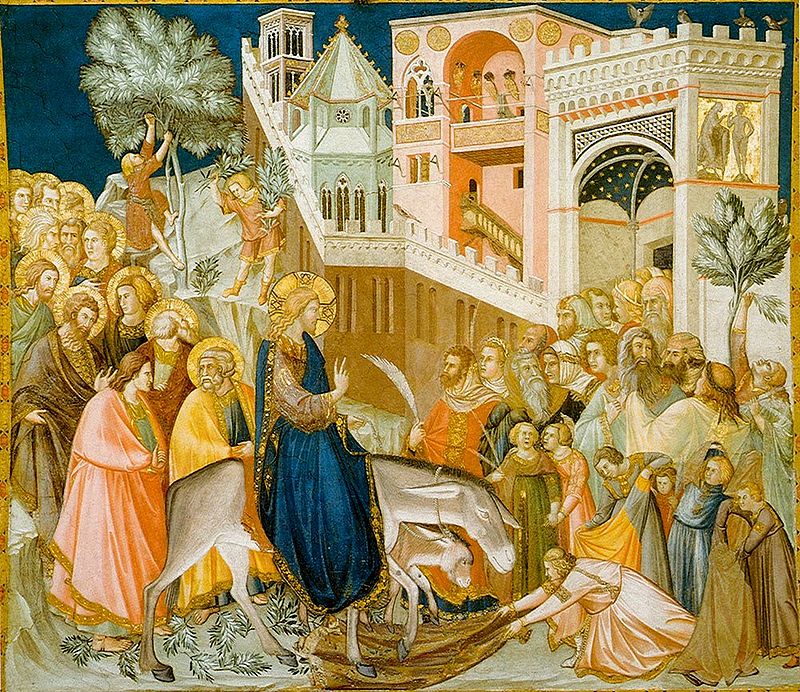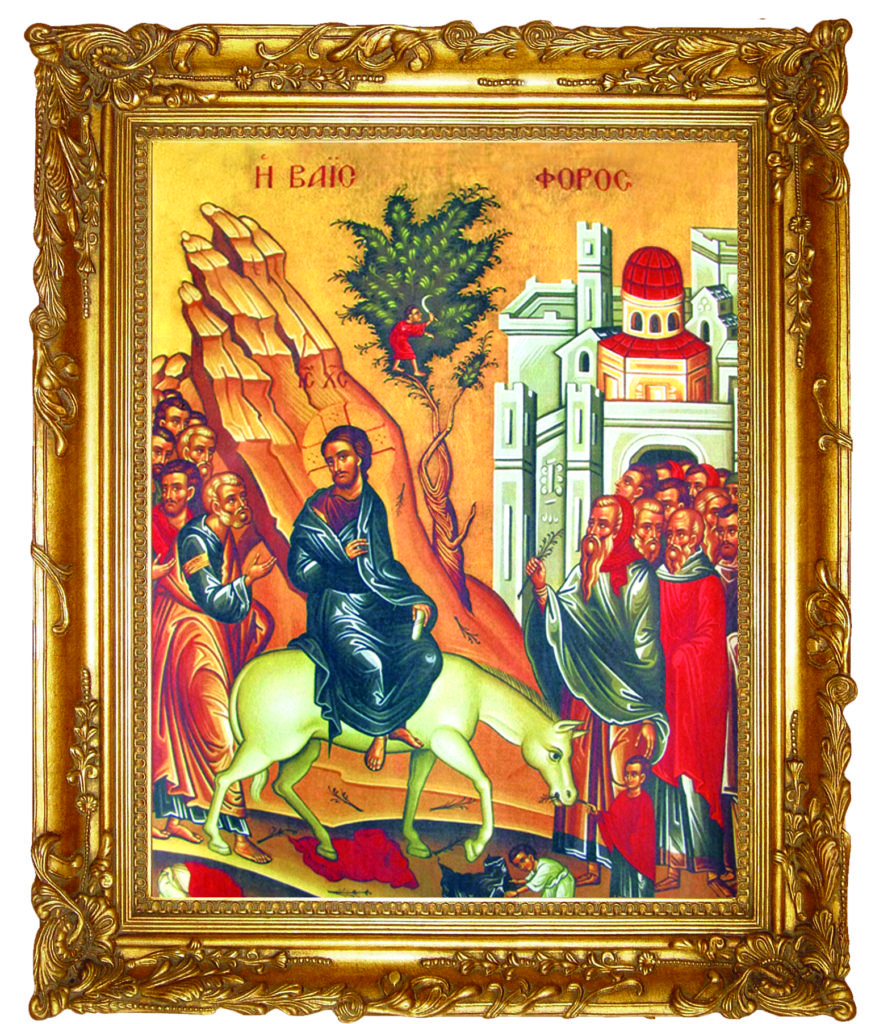You are probably familiar with the English phrase “hold your peace” even if you do not use it in daily conversation. Many people mistakenly assume that the phrase is spelled “hold your piece“, but this actually a separate idiom (“say your piece“). So what exactly does “hold your peace” mean? In short, it means “keep your opinion to yourself”. In the traditional Christian wedding ceremony, for instance, it is customary for an officiating minister to recite the following: “Should anyone here present know of any reason that this couple should not be joined in holy matrimony, speak now or forever hold your peace.” In other words, if you don’t raise any objections now, then be prepared to stay quiet forever. You may be familiar with the phrase “never hold your peace” as a statement of proud loyalty to one’s beliefs despite their unpopularity. Where does this phrase come from?
The origin of the phrase “hold your peace” is the story of Jesus’ triumphal entry into the city of Jerusalem on Palm Sunday. According to the Gospel of Luke, as Jesus enters the city, the Pharisees attempt to silence the messianic celebration of the disciples:
As he was now approaching the path down from the Mount of Olives, the whole multitude of the disciples began to praise God joyfully with a loud voice for all the deeds of power that they had seen, saying, “Blessed is the king who comes in the name of the Lord! Peace in heaven, and glory in the highest heaven!” Some of the Pharisees in the crowd said to him, “Teacher, order your disciples to stop.” He answered, “I tell you, if these were silent, the stones would shout out.” (Luke 19:37-40 NRSV)
As Jesus descends the Mount of Olives atop a colt (fulfilling Zechariah 9:9), the Pharisees worry that the boisterous celebration of the disciples will lead to a riot. In the parallel account of this event found in the Gospels of Matthew and Mark, the disciples simply recite the words of Psalm 118:26: “Blessed be he that comes in the name of the LORD.” Luke, however, inserts the weighty word “king” into the quotation. To have the disciples hail Jesus as a king was dangerous, particularly the week before Passover when the city was packed with Jewish pilgrims and Roman soldiers. This is the reason that the Pharisees try to shush the crowds. Jesus’ response is that it is impossible to bottle up the truth. If his disciples are forced to remain silent, then even the most inanimate of objects – stones – will take up the call to proclaim the truth (a fulfillment of Habakkuk 2:11).
In the King James Version, the phrase “if these were silent” in verse 40 reads “if these should hold their peace”. This, presumably, is the source for the English idiom “hold your peace” used today. But what did Jesus actually say on the Mount of Olives? Obviously he uttered neither of these English phrases. The original text of the Gospel of Luke is in Koine Greek. It contains the word σιωπήσουσιν (“they will be silent”). This is the third person plural form of the future tense verb σιωπάω siopao meaning “to be still.” This verb is used extensively in the Gospels: Zechariah is made mute by the angel Gabriel (Luke 1:20), in the synagogue on the Sabbath Jesus silences his detractors (Mark 3:4), at his trial Jesus is silent before the high priest (Mt 26:63). The trouble, of course, is that Jesus did not speak Greek when he uttered the words “if these were silent” to the Pharisees in Luke 19:40. The language in which he communicated with the Pharisees was either Hebrew or Aramaic, or some combination of the two.

The Entry into Jerusalem by Pietro Lorenzetti. Assisi, Lower Basilica, San Francesco, southern transept
There are three closely related Hebrew roots that refer to the act of being silent: HSH הסה, ḤRŠ חרש and ḤŠH חשה. The three words sound similar, all containing the letters h/kh and s/sh. This is a nice example of onomatopoeia, as it makes the sound “hush”.There is a great deal of overlap between the three words, so let’s take a look at each one individually. The verb HSH means “to be still” as seen for example in the account of the first post-exilic celebration of the festival of Rosh Hashanah in the book of Nehemiah:
Then he said to them, “Go your way, eat the fat and drink sweet wine and send portions of them to those for whom nothing is prepared, for this day is holy to our Lord; and do not be grieved, for the joy of the Lord is your strength.” So the Levites stilled (מַחְשִׁים) all the people, saying, “Be quiet (הַסּוּ), for this day is holy; do not be grieved.” (Nehemiah 8:10-11)
Note that there are in fact two verbs used in verse 11: ḤŠH and HSH. Obviously, the meaning of the two is almost identical. Another Hebrew verb which is closely related is ḤRŠ חרש “to be speechless, mute”. It is often used to refer to God’s silence in face of human prayer. But it has wider applications. This verb is used by Moses to encourage the people to stop bickering prior the crossing of the Sea of Reeds:
But Moses said to the people, “Do not be afraid, stand firm, and see the deliverance that the Lord will accomplish for you today; for the Egyptians whom you see today you shall never see again. The Lord will fight for you, and you have only to keep still (תַּחֲרִשׁוּן).” (Exodus 14:14)
The most likely Hebrew word that Jesus would have used during the Palm Sunday incident in Luke 19 is חשה ḤŠH chashah. This verb means “to keep silent” and is found many times in the Hebrew Bible. Very often it is used to describe a dire situation in which God seems to be unresponsive or inactive to human supplication. For the prophets of ancient Israel, a silent God who does not respond to prayers is a terrible predicament. For example, the prophet Isaiah says:
After all this, will you restrain yourself, O Lord? Will you keep silent (תֶּחֱשֶׁה) and punish us so severely? (Isaiah 64:11)
Similarly we find in the opening verse of Psalm 28:
To you, O Lord, I call; my rock, do not refuse to hear me, for if you are silent (תֶּחֱשֶׁה) to me, I shall be like those who go down to the Pit. (Psalm 28:1)
The most relevant passage from the Hebrew Bible that must have been in the mind of Jesus when he uttered these words on the Mount of Olives is Isaiah’s famous vision of Jerusalem’s vindication:
For Zion’s sake I will not keep silent (אֶחֱשֶׁה)
and for Jerusalem’s sake I will not rest (אֶשְׁקוֹט)
until her vindication shines out like the dawn,
and her salvation like a burning torch.
The nations shall see your vindication,
and all the kings your glory;
and you shall be called by a new name
that the mouth of the Lord will give.
You shall be a crown of beauty in the hand of the Lord,
and a royal diadem in the hand of your God. (Isaiah 62:1-3)








Thanks again you give me a better understanding of the Bible today